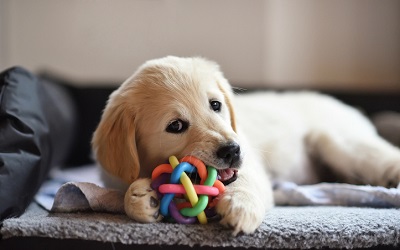
Bringing a new puppy into your home can be an exciting and rewarding experience, but it’s important to be prepared for the behaviours that may come with it. Here are 7 behaviours to look out for in a new puppy, to get you better prepared for your new family addition…
Chewing
Puppies have a natural instinct to chew, and they will often chew on anything they can get their teeth on. This can include furniture, shoes and even electrical cords. It’s important to provide your puppy with plenty of chew toys to redirect their chewing behaviour and prevent them from damaging your belongings, something we all of course want to avoid. You can encourage your puppies to stop chewing by…
Providing chew toys
Puppies love to chew and it’s important to provide them with appropriate chew toys to redirect their chewing behaviour. Choose toys that are made of durable materials, such as rubber or nylon and are designed for puppies to chew on.
Using positive reinforcement
Praise and reward your puppy when they chew on their chew toys instead of other items, such as furniture or shoes. You can use treats or verbal praise to reinforce the behaviour.
Distracting them with playtime
When you notice your puppy starting to chew on something they shouldn’t, distract them with playtime. Engage them in a game of fetch to redirect their attention.
Providing plenty of exercise
Puppies have a lot of energy and need plenty of exercise to burn it off. The amount of exercise your puppy will need will depend on the breed and age of your dog. Make sure your puppy is getting appropriate exercise for the breed, through daily walks and, playtime to help reduce their urge to chew.
Biting
Puppies also have a tendency to nip and bite, particularly when they are playing or teething. While it’s normal for puppies to engage in this behaviour, it’s important to teach them that biting is not acceptable. Encourage positive behaviours and discourage biting through redirection, training and positive reinforcement – this will take persistence and patience, but will all be worth it in the end. Here are some ways you can limit your puppy’s biting…
Socialise your puppy
Socialising your puppy with other dogs and people can help them learn appropriate behaviour around others. This can help your puppy to feel calm – fear and anxiety can lead to biting.
Use a firm “No” command
When your puppy bites, use a firm “no” command to interrupt the behaviour. This will signal to your puppy that biting is not acceptable.
Digging
Your new puppy may also have a tendency to dig, especially if they are left alone for long periods of time or are not getting enough exercise. Providing your puppy with plenty of exercise and mental stimulation can help to reduce this behaviour. Stopping your puppy from digging requires patience and consistency. With time and positive reinforcement, your puppy will learn where it’s appropriate to dig and where it’s not. Here are some tips to help prevent your puppy from digging excessively…
Provide plenty of exercise and mental stimulation.
Puppies that are bored or under-stimulated are more likely to engage in destructive behaviours like digging. Make sure your puppy is getting enough exercise and mental stimulation through playtime, training sessions, and puzzle toys.
Provide a designated digging area
Puppies dig to explore, find cool spots, or bury things. By providing a designated digging area, such as a sandbox or a specific corner of your yard, you can redirect their digging behaviour.
Supervise your puppy
Supervising your puppy when they are outside can help prevent them from digging in areas they shouldn’t. Keep them on a leash or in a fenced area and redirect their attention if you notice them starting to dig.
House-training accidents
It is natural that your puppy won’t be fully house-trained and to expect accidents in the house. Consistency in training, using positive reinforcement techniques, and taking them outside frequently can help speed up the process and minimise accidents.
When you can’t supervise your puppy, confine them to a designated area with access to food, water, and a bed. House-training a puppy takes time and consistency. Be patient with your puppy and remember that accidents are part of the process.
Separation anxiety
Puppies may become anxious or distressed when separated from their owners. Gradual introduction to being alone, the use of positive reinforcement and the creation of a comfortable environment can help to reduce separation anxiety in puppies. Leaving distractions like toys or puzzle feeders will help keep your puppy occupied while you are away. In severe cases, our vet can talk you through medication to help ease anxiety, but this would be on a case-by-case basis.
Excessive barking
Your puppy may bark excessively when they are bored or feel anxious. Proper exercise, training and mental stimulation can help reduce this behaviour – keeping you and the neighbours happy! Training your dog to stop excessive barking can be hard. Gradually exposing your dog to triggers that typically cause barking, such as strangers or other dogs, in a controlled setting is a great way to try and contain your puppy’s barking habits. Reward them for remaining calm and not barking.
Fearful behaviour
Puppies may exhibit fearful behaviour towards new people or situations. Slowly introducing them to new experiences in a positive and controlled manner can help to build their confidence and reduce fearful behaviour. If you sense they are becoming fearful and are hiding behind you in situations or not wanting to move, try using calming techniques to make your dog feel more settled.
Calder Vets
Overall, your new addition to the family will require patience, consistency, and positive reinforcement to help them develop into well-behaved and happy adult dogs. With the right training and guidance, you can help your new puppy develop into a beloved and well-behaved companion.
If you haven’t registered your puppy with us, you can register online here.
At Calder Vets we have a Pet Health for Life plan which spreads the cost of your puppy’s health from as little as £17 per month. This ensures your puppy has all the necessary prevention to live a long, healthy life.
Contact
Call your local branch or click here to book an appointment online.


News